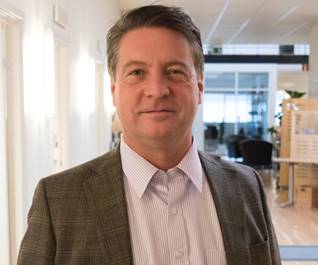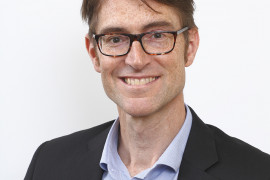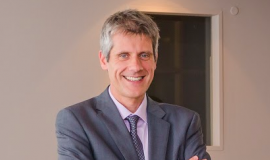 During DHC Days in Lyon, France, we were able to meet with Gunnar Åberg, Product Manager for Regin. He agreed tyo answer a few of our questions about the indutry, with a clear bottom line: end-user engagement might be the future of the DHC Industry.
During DHC Days in Lyon, France, we were able to meet with Gunnar Åberg, Product Manager for Regin. He agreed tyo answer a few of our questions about the indutry, with a clear bottom line: end-user engagement might be the future of the DHC Industry.
We’d like to thank Gunnar and the whole team at Regin for this great oportunity!
Gunnar Åberg: end-user engagement can shape the industry
Can you introduce yourself and Regin to our readers? Who are your clients? What is your role?
Hi, I am Gunnar Åberg, Product Director at AB Regin. We focus on people’s well-being in a sustainable future. Therefore, we supply products that save energy in buildings.
We focus on everything from software, cloud solutions and controllers to valves and actuators. Today, IOT for buildings is a key issue for our company – and one of my areas of expertise.
Our clients are typically installers, system integrators and OEM customers with special requirements on software or product design.
Our typical OEM customer is a manufacturer of district heating systems, ventilation units or heatpumps.
In the company, I’m responsible for our product strategy, product management and I am the head of our development department.
We’re here at DHC Days, one of the first events in France completely focused on district energy. How important are these types of events in shaping the future of the industry?
I think that the DHC days is very important for different actors to learn and get inspired by each other.
The one thing that impresses me the most is the vast number of different countries that are represented.
This is such a great opportunity to share knowledge, experience and know-how, and I feel like the industry wouldn’t be the same without those events.
District Energy has been said to be one of the pillars of the European energy transition. Would you still say the industry is in a good spot?
District heating, district cooling, and especially the use of waste heat, renewable energy and free cooling are very important for the energy transition.
I think the industry is on the right path, but some major challenges still should be addressed:
• End user engagement – To get the everyday citizen truly engaged in questions regarding energy monitoring is a key factor to influence behavior patterns. This puts responsibility on our entire branch as there is a lot of unused potential.
• Investment size – The initial investment costs are very high, especially when it comes to infrastructure. The return on investment is will come, but the time-span is very long-term.
• Public image – People often think that the way district heating is developed and implemented in cities makes the government have sort of an energy monopoly. This can be the same for gas and electricity, but it’s still holding the industry back in my opinion.
What do you find most interesting about the DHC industry?
The most interesting with the DHC industry is the possibility for Regin and other actors in the energy saving business to be important contributors to a sustainable energy supply system.
We all know that fossil fuels are no longer sustainable, and district heating is one of the easiest way to increase the use of renewable energy for everyone. Today most people are aware of this.
District heating is a very efficient way to use our energy, not to mention our waste heat, city waste, etc.
This industry has the potential to become a big part of our world in the future.
You presented on digitalization and district heating during the event. Can you tell us more about it?
My presentation focused on the importance of open systems connected to the cloud. These tools can be used to:
• Engage end-users in how their own behavior and choices can minimize environmental impact
• Better service level to increase intercommunication since information can be made available and understandable to party in need
• Minimize environmental footprints by letting the consumer system take action on the current energy situation
You’re a Swedish company and yet you’re here in France with us: can you tell us how attractive the French market looks?
DHC is quite a mature market in Sweden and we have come quite far regarding the energy transition. I have a strong feeling that France has great opportunities to develop district heating systems thanks to the many waste heat opportunities.
France has highlighted district heating as a big opportunity for the energy transition: what role can the Swedish experience play in the development of DHC in France?
I think that we have a lot of experience having gone through the transition before.
Of course, we have learned from our mistakes and have a lot of experience and know-how to share.
You’ve sponsored DHC Days. How else do you reach out to the DHC community?
We usually reach the DHC community through activities by Celsius, Nordic heating and Sweheat, but also through a lot of our other activities when we talk about energy efficiency and the importance of linking different systems together.
Thanks again to Gunnar for letting us pick his brains, and don’t forget to check out our other interviews from DHC Days!





